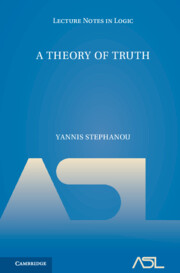
-
Select format
-
- Publisher:
- Cambridge University Press
- Publication date:
- October 2023
- October 2023
- ISBN:
- 9781009437141
- 9781009437189
- Dimensions:
- (229 x 152 mm)
- Weight & Pages:
- 0.68kg, 358 Pages
- Dimensions:
- Weight & Pages:
- Subjects:
- Mathematics, Logic, Categories and Sets, Logic, Philosophy, Programming Languages and Applied Logic
- Series:
- Lecture Notes in Logic (55)
You may already have access via personal or institutional login- Subjects:
- Mathematics, Logic, Categories and Sets, Logic, Philosophy, Programming Languages and Applied Logic
- Series:
- Lecture Notes in Logic (55)
Book description
How should we treat the liar and kindred paradoxes? A Theory of Truth argues that we should diverge from classical logic, and presents a new formal theory of truth. The theory does not incorporate contradictions and is not substructural, but deviates from classical logic significantly, and endorses principles like 'No sentence is both true and false' and 'No sentence is neither true nor false'. The book starts with an introduction to the paradoxes, suitable for newcomers to the subject, before presenting its approach. Four versions of the theory are covered, extending the theory to a determinacy operator and to a full first-order language with quantifiers. Each includes all Tarskian biconditionals that can be formulated in its language. The author uses original methods to prove the consistency of each version and compares the theory to alternative non-classical theories, including Field's paracomplete approach, Ripley's nontransitive system and Zardini's contraction-free calculus.
Contents
Metrics
Full text views
Full text views help Loading metrics...
Loading metrics...
* Views captured on Cambridge Core between #date#. This data will be updated every 24 hours.
Usage data cannot currently be displayed.
Accessibility standard: Unknown
Why this information is here
This section outlines the accessibility features of this content - including support for screen readers, full keyboard navigation and high-contrast display options. This may not be relevant for you.
Accessibility Information
Accessibility compliance for the PDF of this book is currently unknown and may be updated in the future.

